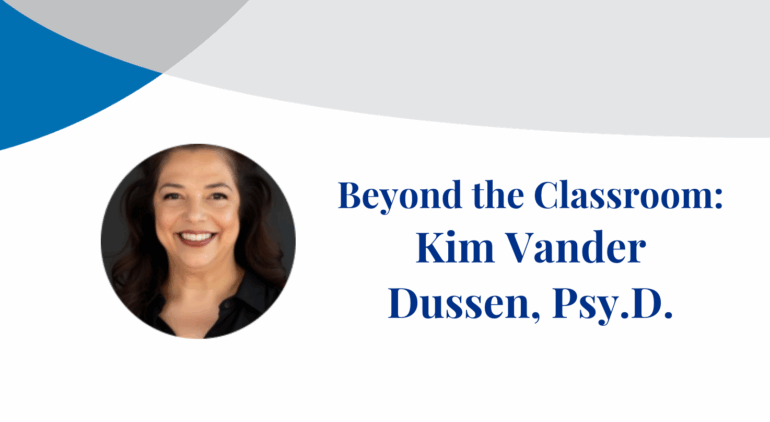BY ISABEL NELSON
For Kim Vander Dussen, Psy.D., play is serious business. A professor in the Psy.D. Clinical Psychology program at The Chicago School, Dr. Vander Dussen is coordinator of the Child and Adolescent concentration. She has been teaching in this field for more than 20 years, but her passion for children’s mental health began long before. “I knew from when I was in high school that I wanted to work with kids,” Dr. Vander Dussen says. “I’ve never wavered from that commitment.”
When she began her graduate studies, she entered a program much like the one in which she teaches today, focusing on child and adolescent psychology and doing her practicums based on the specific needs of young people. Dr. Vander Dussen allowed the children to show her what they needed with the best tool available to them: their play.
“What children were naturally drawn to do whenever they were allowed to be self-directed was play,” Dr. Vander Dussen says, “so I knew they were showing me things that were very meaningful to them.”
Dr. Vander Dussen says that while pursuing more training to better understand children and their play, she “stumbled upon this program where I could get a certificate in play therapy, which then led me to discovering the Association for Play Therapy.” That association, of which she is immediate past chair of the board of directors, was life changing. Although she’d been to many conventions, Dr. Vander Dussen says the people she met through the Association for Play Therapy felt like “her people,” understanding children as complex human beings.
As with any specialized field, however, the average layperson has their own misconceptions about play therapy. “People think that play therapy is using board games to trick kids into talking.” Others assume that it’s only parents who need assistance, but Dr. Vander Dussen thinks that couldn’t be further from the truth. “Children are whole beings with thoughts, feelings, and struggles of their own, and to believe that only parents struggle minimizes the humanness of children,” she says “Play therapy is a whole system for how we engage with children therapeutically, with goals and aims that align with the needs of children.”
That doesn’t mean adults don’t benefit from Dr. Vander Dussen’s work. In a 2023 article for Insight, she detailed how many clinicians had minimal formal preparation for handling the immense trauma caused by war. “The field of professional psychology in Ukraine is in its infancy,” Dr. Vander Dussen wrote. “There is no licensing board, no training requirements, and no oversight. You need only a bachelor’s degree in psychology to practice.”
A group of counseling psychologists had been involved in developing the Play Therapy Training Institute at the University of Central Missouri to support Ukrainian clinicians working with displaced and traumatized children. After Russia’s invasion in 2022, the need for urgent, targeted intervention skyrocketed.
“The circumstances for the clinicians working with children were dire,” Dr. Vander Dussen wrote. “They needed help providing intervention in bomb shelters, with no supplies, no resources, and little to no privacy.”
Dr. Vander Dussen responded by conducting a two-part training focused on play therapy interventions specifically designed for extreme crisis situations, brief techniques that required no resources and emphasized co-regulation between children and caregivers.
Some participants had to log in from bomb shelters, so they often couldn’t turn their cameras on as they learned. “There was a translator I worked with, she was in Kiev at the time,” Dr. Vander Dussen says. “She told me that, as she was translating, and I was directing, she was doing all of [the work] too. She said, ‘Oh, my God, this has helped me so much.’ It was incredibly humbling.”
The success of these sessions led to Dr. Vander Dussen’s invitation to co-lead a more extensive five-month training series with the Neurosequential Network, which develops training and treatment programs. With two other trainers, she introduced foundational principles of developmental trauma and its impact on functioning, providing Ukrainian clinicians with a framework to plan long-term interventions for children in schools and refugee centers.
For Dr. Vander Dussen, the experience was perspective altering and life changing. “There I’d been, complaining about doing therapy over Zoom,” she says. “I’ll never complain about anything I have to do ever again. I recognize that, in America, I get to practice psychotherapy with a degree of privilege.”

